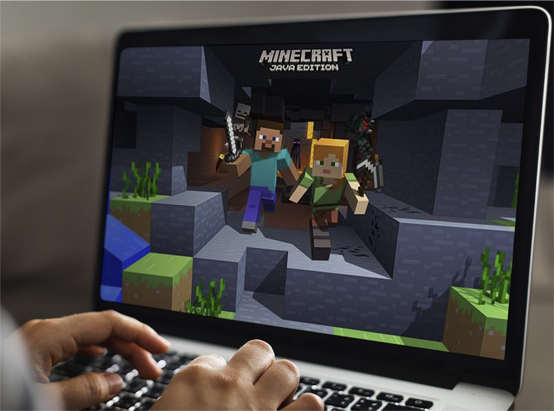When you play Minecraft, there aren’t a lot of choices for avatars. You have Steve and Alex, the default skins in Minecraft – and that’s it. Some people are content with them, but others prefer to change their avatars into something else. If you fit in the latter group, here’s a surprise for you: custom Minecraft skins. These skins are entirely free-form and personalized if players wish.
Getting the skin alone isn’t enough in Minecraft Java, though. You need to download it and save it to your Minecraft account. That way, you can enjoy your new look instead of sticking with Steve or Alex.
If you’re not sure how that works, keep on reading. We have all the steps laid out to break free from “default” into a skin that represents your individuality better.
How to Add a Skin in Minecraft Java on a Mac
Minecraft Java is available on Mac, and we’ll start with the exact process for getting customs skins on any Mac. The process is just about the same as on a Windows PC as well.
Here’s how you’ll get skins for Minecraft Java on a Mac:
- Download a Minecraft skin.

- Open the Minecraft: Java Edition launcher.
- Instead of pressing the Play button, go to the top.
- In the same row, select Skins.

- Select the + sign to add a new skin.

- Browse for your skin on your computer.
- Select Open to load it into the launcher.

- You can then name your skin and, if you wish, choose between Classic and Slim sizes.

- To apply the settings, select Save & Use.

- Launch Minecraft: Java Edition, and you should now be wearing the new skin you downloaded earlier.
You can download skins from any websites that offer them. These skins are also available for editing if you think a personal touch would make them better. Not all websites come with editors, but if you have a program that can edit PNG files, then you can also edit them on your computer.
Make sure the skin’s dimensions and format conform to Minecraft’s standards. In Java Edition, skins can be 64×64 pixels or 64×32 pixels for a legacy look. Arms can be three or four pixels wide.
Using Your Minecraft Account on Mac
Alternatively, if you don’t want to launch Minecraft: Java Edition, you can also change your skin through your profile. Here’s how you’ll do this:
- Log into your account on minecraft.net.

- Select the menu at the top-right corner.
- From the drop-down list, choose Profile.

- Under Skin, select the Browse button.

- Click Select A File.
- Navigate to the folder where your skins are.
- Pick the skin you want to choose.
- Select Open.

- Click Save to change your skin.
- The next time you play the game, your skin will switch to the new one.
The method of using your Minecraft profile is convenient since you can do it on any computer. If you’re traveling and find a skin you want to use, you can always replace your old one by updating your profile.
How To Add a Skin in Minecraft Java on a Windows PC
The exact same process as the Mac will work on any Windows PC. It only takes a few minutes to change your skin as long as you’ve logged into your account on the Minecraft: Java Edition launcher or online.
To change your skin on a Windows PC, follow these steps:
- Download any compatible Minecraft skin for Java Edition.

- Open the Minecraft: Java Edition launcher on your Windows PC.

- Move your mouse to the right of the Play tab.
- Select Skins to open a new menu.

- In this menu, click the big + sign.

- When the browsing window appears, navigate to the skin you want to use.
- Click Open to open it in the launcher.

- Here, you can pick Classic or Slim sizes and name your skin if you wish.
- Click Save & Use to apply these settings.

- Launch the game, and you’ll find your character using the new skin.
Just like on Mac, the skin dimension requirements still apply. If you want to make your own skin, some websites let you create skins and download them. These include:
These websites work for any Minecraft version that allows the use of custom skins.
Using Your Minecraft Account on Windows
The process of uploading your skins to your Minecraft account also works on Windows. The steps are as follows:
- Log into your account on minecraft.net from your Windows PC.

- Click the menu in the top-right corner, represented by three horizontal bars.
- Choose Profile from the menu that appears.

- Go to Skin and click the Browse button.

- Choose Select A File to open a small window.

- Go to your Downloads folder or where you store skins.
- Select the skin you want to use.
- Click Open to upload the skin onto your Minecraft account.

- Click Save to apply the settings.
- When you log into your Minecraft: Java Edition account, you’ll have the new skin equipped.
Of the two methods, the browser method is more convenient. You don’t need to have Minecraft: Java Edition installed. All you need is a computer with Internet access.
How to Get a Skin in Minecraft Java Lunar Client?
Lunar Client is an entirely free mod pack for many versions of Minecraft, including older ones like 1.16 and 1.12. It offers a single install for many popular mods available and also updates the mods automatically. In addition to this feature, it also boosts your game’s performance, increasing the frames per second.
Most importantly, you can also change your skin while using Lunar Client. While you can only use the mods Lunar Client comes with, skins and texture packs aren’t subject to this restriction. Therefore, you can import your favorite skins and use them with this mod pack.
Here’s how you’ll change skins with Lunar Client:
Getting Lunar Client
If you don’t have it already, check out the steps below to install Lunar Client:
- Install Lunar Client.
- Launch Minecraft: Java Edition on Lunar Client.
- Get into a game.
- You’ll notice that your character’s skin is the default one or a skin you previously imported.

Installing the Skin
Installing skins via Lunar Client is relatively similar to using pre-made custom skins. Here’s how to get started:
- Open the original Java Edition launcher.

- Go to the Skins menu.

- Select the Browse button.

- Click Select A File to open Windows Explorer.
- Go and find the skin you want to use.
- Select Open to use the skin.

- Click Save to apply the settings.
- Close the original Java Edition launcher.
- Switch back to Lunar Client.
- Now, your skin should be changed to the new one you just added.

Changing Your Skin for Lunar Client Through Updating Your Account
Since Lunar Client is tied to your official Minecraft account, it also follows that updating your skin through the Minecraft website also works. Lunar Client works on Windows, Mac, and Linux, so the methods work across all operating systems.
Follow these steps to change your Lunar Client skin via Minecraft account update:
- Log into your account on minecraft.net after installing Lunar Client.
- Open the menu at the top-right corner of the screen.
- Among the options, pick Menu.
- Head to Skin and click Browse.
- Choose Select A File to open Windows Explorer.
- Go to the folder where you store skins.
- Select the skin you want to load into Minecraft.
- Click Open to change your current skin.
- Click Save to apply the settings.
- When you launch Lunar Client, your character will have the new skin onscreen.

Additional FAQs
How can I make my own Minecraft skin?
You can make a Minecraft skin through any website that has a skin editor or creator. Alternatively, a program that can modify PNG files like Paint or Photoshop works well too. Both will yield a PNG file that you can upload to skin index websites or your game.
The websites we mentioned above make the process easier, as they already have the dimensions and format covered. Paint and Photoshop are for advanced users who have more experience.
How do you add a skin to the Minecraft launcher?
Go to the right of the Play button and click Skins instead. This tab will let you open a menu where you can add any compatible skin. Click on the plus sign to import a skin and save it onto your Minecraft: Java Edition launcher.
Why didn’t my Skin show in Minecraft after installing?
Older versions of Minecraft, particularly before version 1.7.8 and older, will require some time to reflect skin changes. It can take up to an hour, so you’ll have to wait for a while before the changes take effect.
Why don’t I see my new skin in Minecraft multi-player?
The best way to make the changes appear is to log out and log back in, which should force the skin change to take effect. If everyone seems to be using a default skin, your server may be running in offline mode.
No More Default Skins
There are thousands of skins available for free, and you can always make some with the help of websites. The skins work with Minecraft: Java Edition perfectly, so you don’t have to worry about changing the game’s files. Of course, you can also change your skin through your Mojang profile.
What skin do you use in Minecraft? Have you tried making your own skin? Tell us in the comments section below.
Disclaimer: Some pages on this site may include an affiliate link. This does not effect our editorial in any way.

























